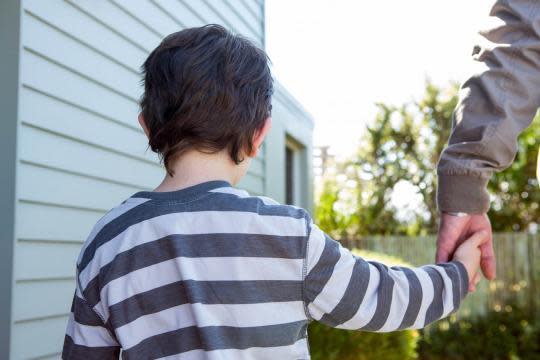Warning Signs of Predators for Parents

How can you tell if someone has ulterior motives for wanting to get closer to your child? An expert identifies three red flags you want to watch out for. (Photo: Corbis Images)
News about sexual offenders is dominating the headlines — most recently about Subway pitchman Jared Fogle, who is reportedly planning to plead guilty to child porn charges and crossing state lines to pay for sex with minors, and admitted teen molester Josh Duggar.
STORY: Should the Duggar Family Really Be ‘Stunned’ by Josh’s Cheating Scandal?
But parents who assume their child could never be a victim should know that the reality is nine out of 10 children who are sexually abused are victimized by someone they know — including relatives, family friends, clergy, teachers, and babysitters, according to the National Children’s Advocacy Center (NCAC).
STORY: Here’s What Experts Had to Say About That Viral Child-Abduction Video
“The offender usually uses coercion and manipulation, not physical force, to engage the child,” reports the American Academy of Pediatrics in a sexual abuse prevention tip sheet for parents. Deborah Callins, prevention director at the NCAC, tells Yahoo Parenting, “They take advantage of a child’s natural curiosity.” So how can mothers and fathers identify the close people most likely to have ulterior motives, or who might want to take advantage of your child? Here are a few simple ways to see the red flags that are often right in front of you:
Take cues from your kids.
“Parents can protect their children by being better listeners,” she says. “Are they hearing what their child is actually meaning? If a child states he or she doesn’t want to spend time with a particular person, the parents may assume their child thinks the person is boring. But the real message the child might be trying to send is that the person makes him or her feel uncomfortable.” So stop a moment and try to really get to the heart of the matter before you insist that little Madison drive to the park with Uncle Jim to play on the swings if she’s dragging her feet. “Your children could be sending you little hints,” explains Callins. “You need to dig a little for more information.”
Consider whether someone seems to be ‘testing’ your child’s ability to protect himself.
Does a family friend always insist on “hugging, touching, kissing, tickling, wrestling with or holding a child, even when the child does not want this physical contact or attention?” asks sexual abuse prevention organization Stop It Now! in its resource sheet, Behaviors to Watch Out for When Adults are with Children. Such seemingly innocuous behaviors indicate that the adult is ignoring a child’s social, emotional and physical boundaries — and that’s a big red flag.
Take note if a person is sexually suggestive around your kid.
If someone always tends to point out sexual images, or tells dirty or suggestive jokes in the presence of kids, take heed, suggests Stop It Now! That goes for comments about a child’s “developing body” or a teen’s dating details, too. “It may be nothing, or it may be a warning signal that the person is grooming your child,” explains Callins. He or she may be trying to figure out how curious your child is about sex, how much they know about it, and whether they may be willing to participate in it. “Perhaps the parent doesn’t even realize that it’s an issue — ‘Oh, that’s just how my cousin is,’ or ‘That’s just how he talks,’” she says. “But it could also be a test.”
Callins advises removing your child from such a situation if it makes you or your kid uncomfortable, and then talking about it separately afterward with both the person and your child. “That way, it’s out in the air,” she says. And that way there’s no question about your boundaries — and whether you’ll be aware if somebody tries to cross them.
Please follow @YahooParenting on Facebook, Twitter, Instagram, and Pinterest. Have an interesting story to share about your family? Email us at YParenting (at) Yahoo.com.

